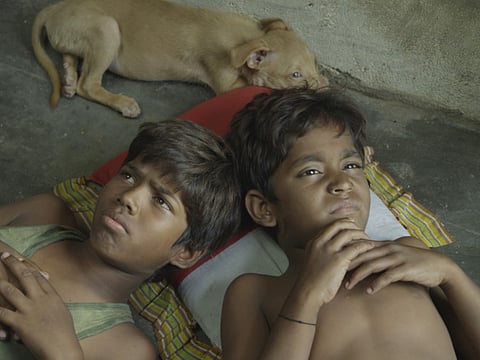Review: ‘Kaakka Muttai’ is a rare gem
First time film-maker Manikandan shatters stereotypes with simple but heartfelt story

When ‘Kaakka Muttai’ begins, you are not greeted by a loud and flashy song introducing the hero of the film.
Instead the camera lingers inside a shanty home, where a family of four are asleep. Sorry, a family of five. How could I forget the little brown puppy that is sleeping soundly in a corner?
A little boy, our little hero, wakes up to find that he has wet himself. He quickly mops up the mess with his shirt, before the puddle reaches his mother’s side.
We don’t know his name nor the name of his older brother. But the little boy calls himself ‘chinna kaakka muttai’ (small crow’s egg). That’s because he and his older brother steal crow’s eggs from its nest and drink it up.
Their father is in prison and they live with their mother and paternal grandmother. Their mother pulls them out of school and sends them to the neighbourhood railway tracks to gather coal that falls off railway wagons. They sell the chunks of coal to the local vendor who pays them Rs3 (Dh0.17) per kilogram.
When a free television set distributed by the government arrives at home, the boys’ joy knows no bounds. Now they can watch their favourite stars and even dance along with them.
What catches their attention during a commercial break is a cheese-laden pizza slice endorsed by none other than actor Simbu.
The brothers decide that they must taste a pizza and they begin saving money for it — their target being Rs300. They go about collecting coal with even greater vigour, sometimes even taking on other odd jobs to reach their goal quicker.
Eventually, with Rs300 in their pockets, they walk up to a new pizza restaurant in their neighbourhood but they are turned away by the doorman.
Why were they denied entry despite having money, they wonder? Their friend, a linesman checking railway tracks, tells them that their shabby attire revealed the fact that they belonged to the slums.
Not ones to give up, the boys decide to buy themselves new clothes and then get themselves a pizza. For this they need to save up another Rs200.
Do they eventually get a chance to bite into that tantalising pizza?
Manikandan is a wonderful story-teller. Very patiently he takes you on a journey with the two boys trying to satiate their craving. There is not a single dull moment in the film, with healthy humour tickling you now and again. I loved the boys’ grandma, who comes up with the idea of making a pizza at home and painstakingly chops tomatoes and capsicums, exactly the way it is shown on the flyer advertising a pizza.
With innocence writ on their faces, the two boys wait in great anticipation for her to serve them and when she does, they realise it is a ‘dosa’ (a south Indian delicacy) was dressed up like a pizza.
Manikandan has created his characters with great love and his attention to detail is commendable.
I can’t help recalling the scene where the boys’ mother visits her husband in prison. The conversation that takes place across the wall between the father and his two sons, who are playing outside with a kitten, is remarkable.
Shot in authentic locations, Manikandan’s visuals are realistic. You can almost feel the stench of the slum in many scenes.
Manikandan does not just stop with the children’s dreams of eating an Italian delicacy. Without exploiting their poverty, he nudges you into seeing the economic divide between the haves and the have-nots. And steering the story ahead, he exposes the hypocrisy of people and politicians, while taking a dig at television channels known for sensationalising news.
Another plus is the apt casting. The two child actors, Vignesh and Ramesh, are natural performers and deserving of their National awards. Aishwarya Rajesh, who played their mother, slips under the skin of a slum woman with unbelievable conviction. How did the jury overlook her work? I wonder.
Without a star cast or exotic locations, here is a director who dared to present a simple story, without trapping himself in the regular mould of Tamil cinema. Take a bow Manikandan.
‘Kaakka Muttai’ is a brilliant nugget. Watch it with your family.
Sign up for the Daily Briefing
Get the latest news and updates straight to your inbox


